-
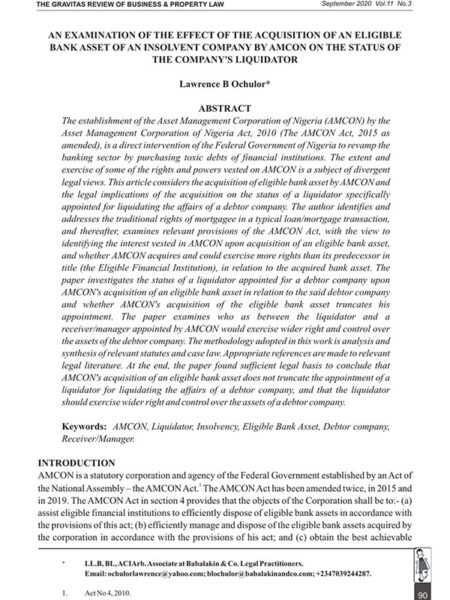
An Examination of the Effect of the Acquisition of An Eligible Bank Asset of an Insolvent Company by AMCON on the Status of the Company’s Liquidator
0₦2,500.00Lawrence Ochulor, Associate at Babalakin & Co. Lagos Nigeria, in his article, An Examination of the Effect of the Acquisition of An Eligible Bank Asset of an Insolvent Company by AMCON on the Status of the Company’s Liquidator, considers the acquisition of an eligible bank asset by AMCON and the legal implications of the acquisition on the status of a liquidator specifically appointed for liquidating the affairs of a debtor company. Lawrence interrogates the traditional rights of a mortgagee in a typical loan/mortgage transaction, the interest vested in AMCON on the acquisition of an eligible bank asset, whether AMCON acquires and could exercise more rights than its predecessor in title concerning the acquired bank asset, the status of a liquidator appointed for a debtor company, and whether AMCON’s acquisition of the eligible bank asset truncates the liquidator’s appointment
-
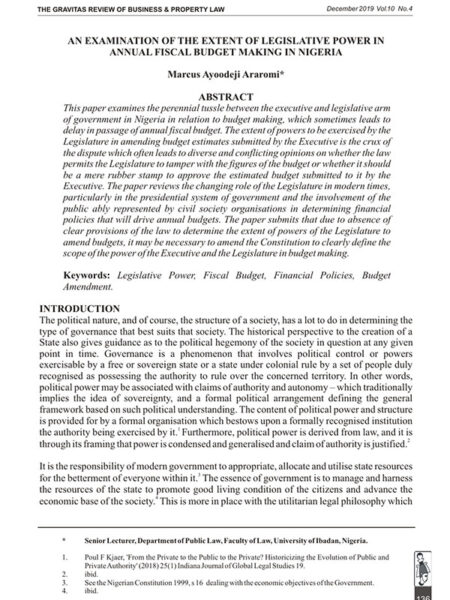
An Examination of the Extent of Legislative Power in Annual Fiscal Budget Making in Nigeria
0₦2,500.00Marcus Araromi, Senior Lecturer at the University of Ibadan, Nigeria in, An Examination of the Extent of Legislative Power in Annual Fiscal Budget Making in Nigeria, contributes to the debate on the extent of the power of the National Assembly to tinker with the budget estimates submitted to it by the Executive. The crux of the perennial disputes between the Legislature and the Executive has been whether the law permits the Legislature to tamper with the figures of the budget or whether it should be a mere rubber stamp to approve the estimated budget submitted to it by the Executive. Araromi reviews the changing role of the Legislature in modern times and the compelling logic of the proponents of the opposing views. He concludes that there is an absence of explicit provisions in the law enabling the Legislature to amend budgets and it is necessary to amend the Constitution to clearly define the scope of the power of the Executive and the Legislature in budget making.
-
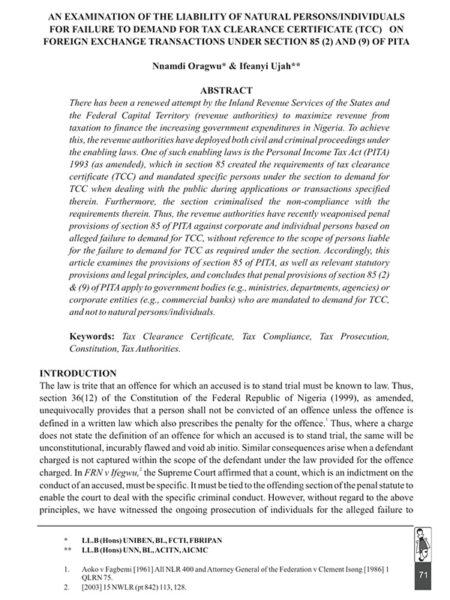
An Examination of the Liability of Natural Persons/Individuals for Failure to Demand for Tax Clearance Certificate (TCC) on Foreign Exchange Transactions under Section 85 (2) and (9) of PITA
0₦2,500.00Nnamdi Oragwu, Esq and Ifeanyi Ujah, Esq, in their article, An Examination of the Liability of Natural Persons/Individuals for Failure to Demand for Tax Clearance Certificate (TCC) on Foreign Exchange Transactions under Section 85 (2) and (9) of PITA, examine the provisions of section 85 of PITA, as well as relevant statutory provisions and legal principles, and concludes that penal provisions of section 85 (2) & (9) of PITA apply to government bodies or corporate entities who are mandated to demand for TCC, and not to natural persons/individuals. There has been a renewed attempt by the Inland Revenue Services of the States and the Federal Capital Territory (revenue authorities) to maximize revenue from taxation to finance the increasing government expenditures in Nigeria. To achieve this, the revenue authorities have deployed both civil and criminal proceedings under the enabling laws. One of such enabling laws is the Personal Income Tax Act (PITA) 1993 (as amended), which in section 85 created the requirements of tax clearance certificate (TCC) and mandated specific persons under the section to demand for TCC when dealing with the public during applications or transactions specified therein.
-
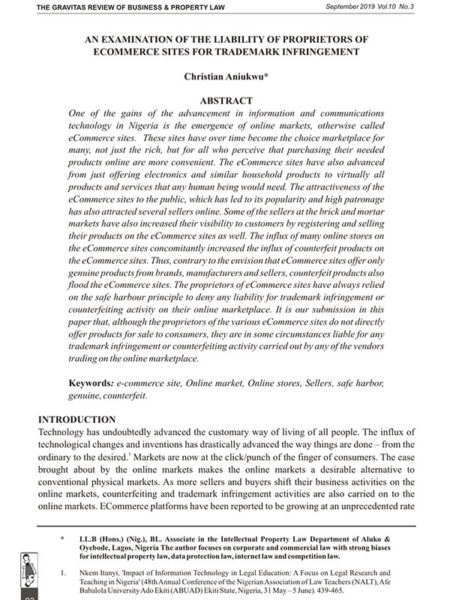
An Examination of the Liability of Proprietors of E-Commerce Sites for Trademark Infringement
0₦2,500.00Christian Aniukwu of Aluko and Oyebode, in his article An Examination of the Liability of Proprietors of Ecommerce Sites for Trademark Infringement, reflects on the emergence of eCommerce, including its convenience and attractiveness, but points to the likelihood of trademark infringement on eCommerce sites which may go without any liability due to the difficulty in tracing perpetrators. He argues that the proprietors of eCommerce sites in some circumstances should be held responsible for trademark infringement on their sites rather than being allowed to avoid liability under the safe habour principle. He discusses practical steps that may be employed in fighting online counterfeiting of brands.
-
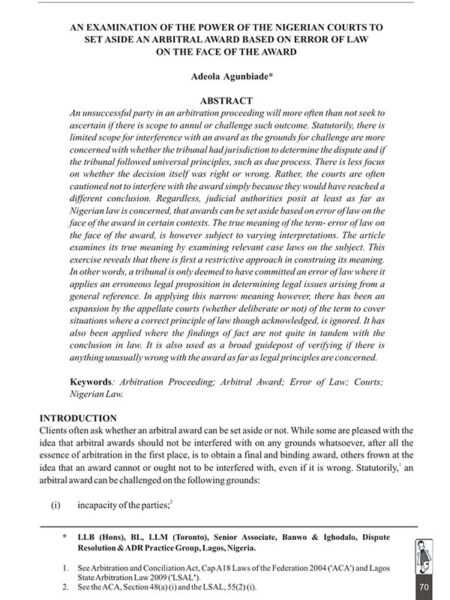
An Examination of the Power of the Nigerian Courts to Set Aside an Arbitral Award Based on Error of Law on the Face of the Award
0₦2,500.00Adeola Agunbiade, Senior Associate at Banwo & Ighodalo, Lagos Nigeria in An Examination of the Power of the Nigerian Courts to Set Aside an Arbitral Award Based on Error of Law on the Face of the Award argues that there is a limited scope for interference with an award as the grounds for challenge are usually whether the tribunal had jurisdiction to determine the dispute and if the tribunal followed universal principles, such as due process. There is less focus on whether the decision itself was right or wrong. However, courts can set aside an arbitral award based on an error of law on the face of the award. Adeola examines the true meaning of the term in the context of various judicial authorities.
-
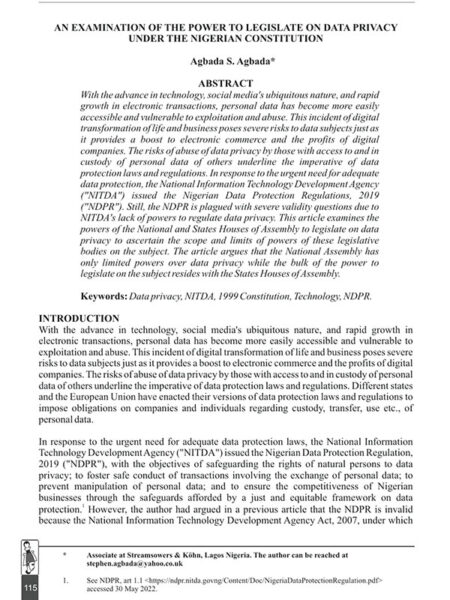
An Examination of the Power to Legislate on Data Privacy under the Nigerian Constitution
0₦2,500.00Stephen Agbada, Associate at Streamsowers & Köhn, in his article, An Examination of the Power to Legislate on Data Privacy under the Nigerian Constitution, notes that in response to the urgent need for adequate data protection, the National Information Technology Development Agency (NITDA) issued the Nigerian Data Protection Regulations, 2019 (NDPR). Does NITDA have the power to regulate data privacy? What is the difference between Data Privacy and Data Protection? Is Data Protection an Exclusive, Concurrent or Residual List item under the Nigeria Constitution? Agbada proffers his views on these pertinent questions in his examination of the powers of the National and States Houses of Assembly to legislate on data privacy.
-
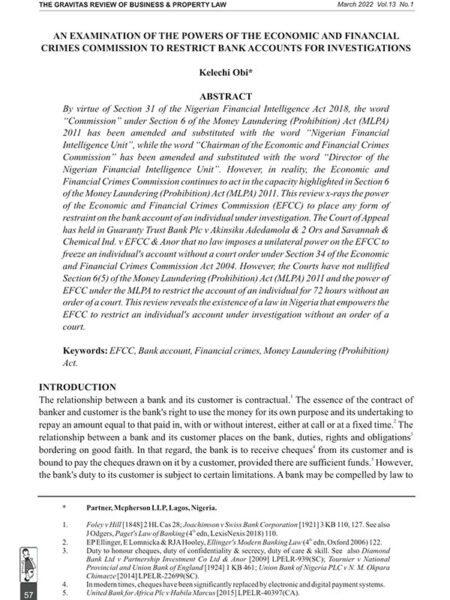
An Examination of the Powers of the Economic and Financial Crimes Commission to Restrict Bank Accounts for Investigations
0₦2,500.00Kelechi Obi, Partner, McPherson LLP, Lagos, Nigeria, in his article, An Examination of the Powers of the Economic and Financial Crimes Commission to Restrict Bank Accounts for Investigations, considers the provisions of the Nigerian Financial Intelligence Act 2018, the Money Laundering (Prohibition) Act 2011 (as amended), the Economic and Financial Crimes Commission Act 2004 in x-raying the powers of the EFCC to place restraint on the bank account of an individual under investigation. Kelechi reviews two crucial decisions of the Court of Appeal on the issue and concludes that there is a law that empowers the EFCC to restrict an individual’s account under investigation without an order of a court.
-
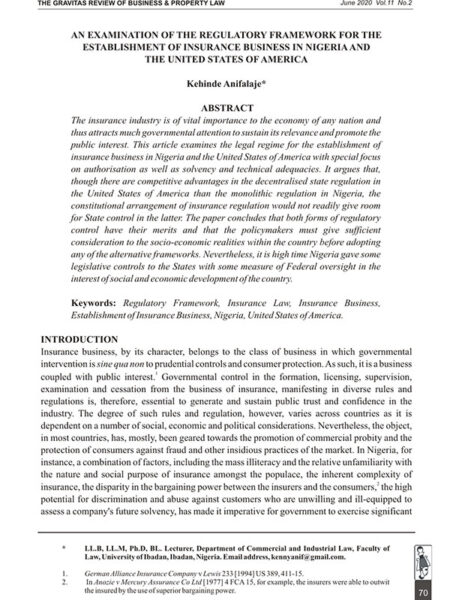
An Examination of the Regulatory Framework for the Establishment of Insurance Business in Nigeria and the United States of America
0₦2,500.00Dr Kehinde Anifalaje of the Department of Commercial and Industrial Law Faculty of Law, University of Ibadan Nigeria in his article, An Examination of the Regulatory Framework for the Establishment of Insurance Business in Nigeria and the United States of America, examines the legal regime for the establishment of insurance business in Nigeria and the United States of America with special focus on authorisation as well as solvency and technical adequacies. Dr Anifalaje argues that though there are competitive advantages in the decentralised state regulation in the United States of America than the monolithic regulation in Nigeria, the constitutional arrangement of insurance regulation would not readily give room for State control in the latter. He concludes that both forms of regulatory control have their merits and that the policymakers must give sufficient consideration to the socio-economic realities within the country before adopting any of the alternative frameworks.
-
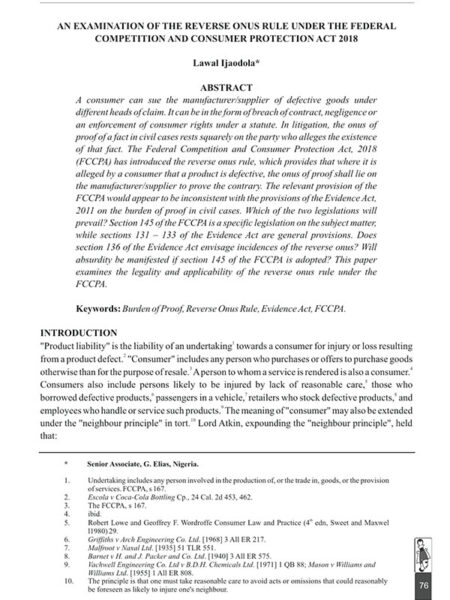
An Examination of The Reverse Onus Rule Under the Federal Competition and Consumer Protection Act 2018
0₦2,500.00Lawal Ijaodola, Senior Associate, G. Elias, in his article, An Examination of The Reverse Onus Rule Under the Federal Competition and Consumer Protection Act 2018, notes that a consumer can sue the manufacturer/supplier of defective goods under different causes of action. It can be in breach of contract, negligence, or an enforcement of consumer rights under a statute. In litigation, the onus of proof of a fact in civil cases rests squarely on the party who alleges the existence of that fact. The Federal Competition and Consumer Protection Act 2018 (FCCPA) has introduced the reverse onus rule, which provides that where it is alleged by a consumer that a product is defective, the onus of proof shall lie on the manufacturer/supplier to prove that the product is not defective. The relevant provision of the FCCPA would appear to be inconsistent with the provisions of the Evidence Act 2011 on the burden of proof in civil cases. Which of the two laws will prevail? Section 145 of the FCCPA is a specific legislation on the subject matter, while sections 131 – 133 of the Evidence Act are general provisions. Does section 136 of the Evidence Act envisage incidences of the reverse onus? Will absurdity be manifested if section 145 of the FCCPA is adopted? Lawal examines the contending issues and the legality and applicability of the reverse onus rule under the FCCPA.
-
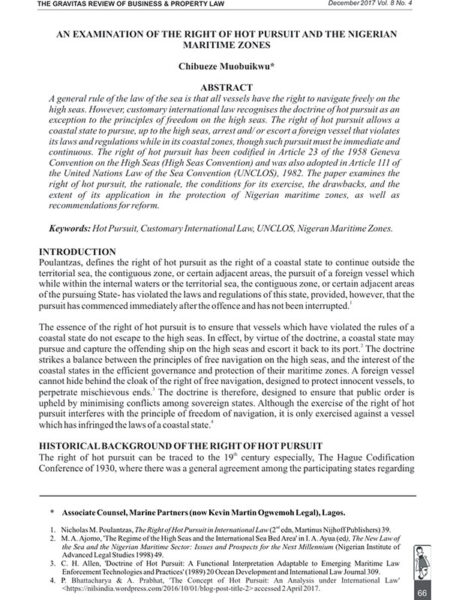
An Examination of the Right of Hot Pursuit and the Nigerian Maritime Zones
0₦2,500.00Chibueze Muobuikwu, Associate, Marine Partners, conducts “An Examination of the Right of Hot Pursuit and the Nigerian Maritime Zones”. He explains that the customary international law right of hot pursuit, allows a coastal state to pursue, up to the high seas, arrest and/or escort a foreign vessel that violates its laws and regulations while in its coastal zones. He notes that the right of hot pursuit has been codified by the Geneva Convention on the High Seas 1958, and adopted by the United Nations Law of the Sea Convention 1982. Chibueze examines the right of hot pursuit, the rationale, the conditions for its exercise, and the drawbacks, and the extent of its application in the protection of Nigerian maritime zones.
-
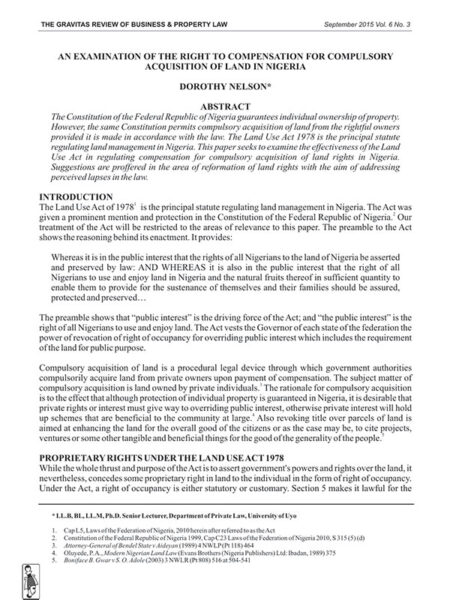
An Examination of the Right to Compensation for Compulsory Acquisition of Land in Nigeria
0₦2,500.00Dr. Dorothy Nelson, Senior Lecturer, Department of Private Law, University of Uyo, in her article “An Examination of the Right to Compensation for Compulsory Acquisition of Land in Nigeria” discusses the right to compensation under the Land Use Act and argue that while compulsory acquisition may be necessary for societal growth, acquisition, via revocation of interest, must scrupulously comply with the template laid by the Supreme Court in the case of Osho v Foreign Finance Corp.
-
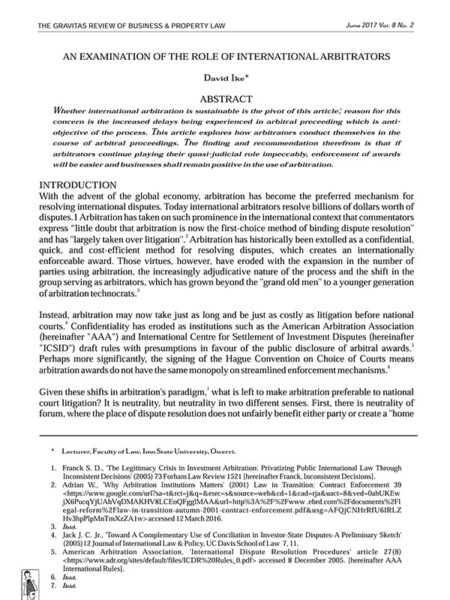
An Examination of the Role of International Arbitrators
0₦2,500.00David Ike,Faculty of Law, Imo State University, Owerri in his article “An Examination of The Role of International Arbitrators”,posits that while Arbitration has been extolled as a confidential, quick, and cost-efficient method for resolving disputes, those virtues have been eroded with the expansion in the number of parties using arbitration, the increasingly adjudicative nature of the process and the shift in the group serving as arbitrators. He considers the role international arbitrators should play in providing independent, adjudicative services to honour the parties’ expectations and contribute to the legitimacy of international arbitration. He explores the adjudicatory and administrative roles of arbitrators, opportunities to address misconduct during and after proceedings, and how market-based and institutional incentives are used to encourage appropriate conduct among arbitrators.
The Gravitas Review of Business & Property Law



